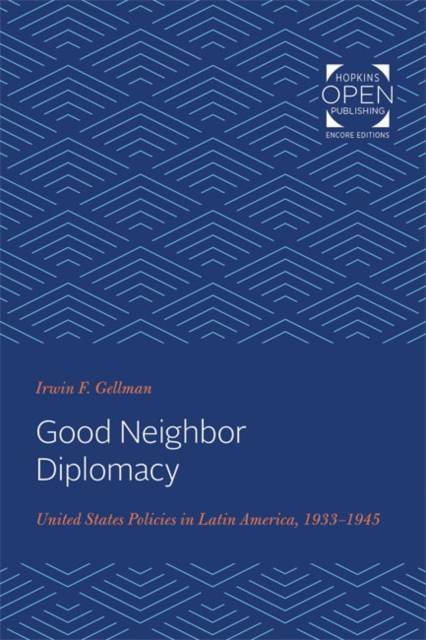
- Afhalen na 1 uur in een winkel met voorraad
- Gratis thuislevering in België vanaf € 30
- Ruim aanbod met 7 miljoen producten
- Afhalen na 1 uur in een winkel met voorraad
- Gratis thuislevering in België vanaf € 30
- Ruim aanbod met 7 miljoen producten
Omschrijving
Originally published in 1979. American diplomacy during Franklin D. Roosevelt's presidency has received much attention, with one notable exception--the United States' relations with Latin America. Irwin Gellman's book corrects this past neglect through a perceptive analysis of FDR's "Good Neighbor" efforts in Latin America. Based on a fresh examination of State Department records and extensive manuscript sources (including an unprecedented use of Nelson Rockefeller's oral history archives), the book points out the complexities of Good Neighbor diplomacy and its intimate relationship to Roosevelt's global strategies. As background to his discussions of FDR's policies, Gellman looks first at how Latin American affairs were handled during the administrations of Harding, Coolidge, and Hoover, the three Republicans who preceded Roosevelt in office. Good Neighbor diplomacy, Gellman shows, was not a carryover from these administrations; it bore the distinctive mark of FDR's own making. He then describes how Roosevelt's policy of nonintervention worked, particularly how military force was superseded by more subtle diplomatic maneuverings.
Turning to a discussion of economic relations with Latin America, Gellman focuses on how the United States' own situation--cut off from international trade by the Depression--encouraged regional expansion. And, finally, he looks at how Roosevelt parlayed the threat of war in Europe and the specter of Nazi penetration in the Americas to further solidify a hemispheric stand. Gellman's account vividly demonstrates that Good Neighbor diplomacy was as much the product of personality as it was of policy. In particular, it emerged out of the rivalries and alliances among three men: Roosevelt; his Secretary of State, Cordell Hull; and Assistant Secretary of State, Sumner Welles. Gellman (the first to have access to FBI files on Welles) characterizes FDR as an astute politician who saw an opportunity to use pan-Americanism to restore America to world prominence--yet could not handle the personality conflicts among those in his own ranks. Gellman shows how tenuous a government policy can be when so much of it depends on personal control and influence.
Specificaties
Betrokkenen
- Auteur(s):
- Uitgeverij:
Inhoud
- Aantal bladzijden:
- 314
- Taal:
- Engels
- Reeks:
Eigenschappen
- Productcode (EAN):
- 9781421431345
- Verschijningsdatum:
- 1/12/2019
- Uitvoering:
- Paperback
- Formaat:
- Trade paperback (VS)
- Afmetingen:
- 152 mm x 229 mm
- Gewicht:
- 462 g

Alleen bij Standaard Boekhandel
Beoordelingen
We publiceren alleen reviews die voldoen aan de voorwaarden voor reviews. Bekijk onze voorwaarden voor reviews.











